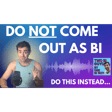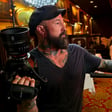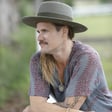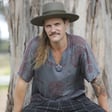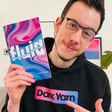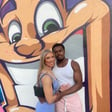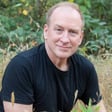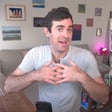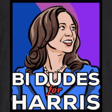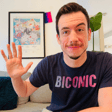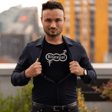Introduction and Guest Welcome
00:00:12
Speaker
Hello, everybody. Welcome to Two Bye Guys, continuing my interviews with the subjects of my book, Bisexual Married Men, Stories of Relationships, Acceptance, and Authenticity. And I'm so happy to see my friend Austin Miller here for the second time on Two Bye Guys and the third or fourth or fifth time that we've zoomed together over the past few years. Welcome to Two Bye Guys, Austin. Hi. Thank you. It's really good to be here.
00:00:43
Speaker
Yes, it's very nice to see you again. One of the few people I've from the book who I've actually met in person, we had a lovely lunch a few months ago now. Wow, it was probably a while ago now. I can't keep track of time. But lovely, lovely to meet you in person. And to just see your whole story evolve.
Austin's Bisexual Journey and Book Involvement
00:01:07
Speaker
And I think it's one of the
00:01:09
Speaker
most complicated and beautiful stories in the book. And there's just so many aspects of it that I've learned a lot from and have been inspired by. But I know it's been challenging and scary. And so welcome back. Thank you for being here to talk about it.
00:01:27
Speaker
So you've been on the podcast before you were on, uh, you were on, um, I actually just looked it up. It was April, 2021. That sounds right. Yeah, I think so. I think it was either two or three. Yeah.
00:01:47
Speaker
No, you're right. Oh, my God. It was way back in season two. It was it was before we knew that this would be a book, I think it was just like we had done that first interview and I was like, let's let's get some people on the podcast. And so we heard a bit of your story there, but it was kind of compressed. It was one of three stories in a short episode. And so now people can get a little more. And of course, in the book, they're going to get
00:02:14
Speaker
the full story, at least up to a certain point. And in the book, your pseudonym is Quentin, so people can connect that. Your pseudonym, for some reason, I chose something that sounded kind of like your real name. I didn't do that for everyone. But let's talk about it and what's happened since. But I want to ask you first, before we get into the story,
00:02:41
Speaker
Why did you decide to participate in this project in the first place?
Identity Processing and Community Building
00:02:47
Speaker
Oh, that's a good question. I mean, one of the main reasons is because I was like early on in the first interview, I was like going through a lot of identity stuff myself. And I was just like, it was a way that I was processing it. And I tend to process things very
00:03:06
Speaker
interactively with people, and I'm not one to go away to a little cabin and come away and say, here I am. It's more of this conversation. And so for me, this was just a continuation of that, something I was already doing on a smaller level. Cool. Awesome. I'm going to ask you later what you learned from doing that, or we'll get it. Well, let me just ask you now, what did you learn by doing it and talking to me about it?
00:03:36
Speaker
I think the discipline of actually putting towards things I'd only just felt inside was really a good thing for me because then I was really like, yeah, this really is the way it is. It's not just this fuzzy thing anymore. And then the sort of affirmations that came in from people that listened to the podcast and sent me a direct message or something like, thanks for your story.
00:04:02
Speaker
this is my story. And so then I had this ongoing conversation that sort of not only spoke to my story and gave some sort of validation to what my experience was, but it also was it reciprocated that to them as well. So it was a community building thing in a way.
00:04:21
Speaker
Yeah. Oh, that's beautiful. And I've, I've noticed the same thing for myself too. Yeah. Okay, so obviously, there's a lot there's going to be more details in the book. But just to give people a sense of of your story.
Conservative Upbringing and Marriage
00:04:39
Speaker
Tell me about your bi journey.
00:04:41
Speaker
like the brief version, how you realized it, and then also you married your wife relatively young, so how did it all intersect with meeting your wife and your relationship?
00:04:58
Speaker
Yeah, to put that in a nutshell is a little difficult. But yeah, I was raised in a Mennonite household, which is, it was a conservative Mennonite, so a very sort of religious subculture that sort of is based in Christianity. And it was a very good childhood. I was a missionary kid, so I wasn't like in the
00:05:26
Speaker
sort of little Mennonite communities for the first... I mean, I was for the first 10 years of my life, but then I moved to...
00:05:38
Speaker
with my parents to a mission school. And so it was very remote. I didn't really have cultural models for my sexuality at all. So I just experienced what I experienced. I was attracted to boys. I was attracted to girls. And I think the first I came to that realization was when, I mean, 10, 11, 12 even, and
00:06:06
Speaker
because of the culture I grew up in, there was just sort of this understanding that, okay, this is acceptable. This attraction to girls and this attraction to boys is not acceptable. So I just sort of didn't even make a conscious decision. I just lived my life in that trajectory. And so it was natural then once I
00:06:34
Speaker
Yeah, it was interesting because I was a very spiritually attuned kid and I had these experiences with spirit or God or whatever you want to call it that really resonated with me and I felt connected to something beyond myself. And yet there was this idea within my culture that there was something essentially wrong with me. And so I felt like
00:07:02
Speaker
that voice that I've heard and the culture I was in was at conflict. And so I spent decades trying to reconcile what that means to me because spirituality was a very important part of my life.
Reflections on Marriage and Divorce
00:07:18
Speaker
And eventually that meant I did leave that subculture of that. And that wasn't the only reason either. There was other reasons as well.
00:07:33
Speaker
Um, but so I got married in 1998 and that was, um, we were in love and we were young and we were both interested in being missionaries ourselves. So that was, that was a, um, yeah, it's kind of a complicated time because I, I look back and I'm like,
00:08:01
Speaker
Was this real or wasn't it real? Because since then I sort of changed my view of how, of my faith as well as I'm no longer married to my wife. So, so I'm like, was that, was that real? But I, for me it was very real. It was, we loved each other. We have three beautiful sons and so, um,
00:08:30
Speaker
Yeah, and so we were married for about 25 years. And yeah, and our divorce was very recent. So yeah, that was not in the original podcast. And that was not something that I had seen on the horizon at that time.
00:08:58
Speaker
There has been a second chapter or tenth chapter since then and there's a lot of things in between but I was just I was thinking about this I had a really close friend pass away recently and I went to the funeral and there was so many people from my childhood on up and
00:09:25
Speaker
And somebody mentioned like, Oh, isn't it interesting to see people from your past life or your past lives or whatever? And I'm like, well, this is my life. Like I haven't really changed or anything. And my relationships with these people are picking up if they chose to not continue them or I did, it was, I mean, we're still in the same life. And so I just felt this, um,
00:09:51
Speaker
this connection to all of who I was throughout that whole process and not feeling like I need to shed something from this part of my past in order to become something new.
Post-Divorce Personal Growth
00:10:01
Speaker
Rather, I'm building on something that's always been and valuing those things along the way that help me to become who I am.
00:10:10
Speaker
Yeah, really interesting. I love that perspective. And yeah, a lot has happened since we first spoke and did that first and second interview. Let me ask you about that because it's clearly fresh and still something going on in your life, or I want to ask how you're moving forward, too. But I remember, I want to ask this because I remember when we first talked on the podcast and
00:10:39
Speaker
And for the book, you were in that marriage, and the idea of leaving it was scary. And how did you reconcile that? And how do you look at it now, now that you're out of the marriage? How do you look back at how difficult it was to confront this with that possibility that the marriage couldn't?
00:11:11
Speaker
Oh, this is an interesting question because I mean, when you're in a marriage, you're two separate people, but sort of in the
00:11:25
Speaker
Christian narrative that I was taught you become one and so and and I think There's a tendency and I don't think this is what is meant by becoming one within the Christian tradition But people lose their sense of self and they end up deferring to each other and I know I did that in my marriage So I was when I did when I think a lot of the fear of that ending was who am I? without her and so that's been a real
00:11:53
Speaker
journey, which is, it's it's been exciting, because I, I all of a sudden realized that, oh, there's these parts of me that I've sort of pushed down, just out of deference to her. And it was because I loved her and because I was committed to her. But nonetheless, there was a part of myself that I said, that I said, Okay, well, this can be put to the side. And all of a sudden, there's, we're no longer together. And I, and I'm
00:12:23
Speaker
even thinking about another relationship, I'm like, well, I can define how it looks. Like I can say what I want, and I can, and so that in a way is a bit of a freedom. The other thing that's kind of difficult is, I mean, so one thing, we are, my ex-wife and I, we still run a business together,
00:12:49
Speaker
We're still parenting together. Our our youngest son is 19 years old. So it's not like there's custody issues or anything but So we have a lot of contact with each other and One of the frameworks that we looked at was that we're changing the container of our love because we both really wanted to maintain the friendship and That was a really sort of
00:13:18
Speaker
For me, that was really helpful with the transition. Just having a framework to say, okay, this is
Redefining Relationship Success
00:13:31
Speaker
not a failure of a marriage. This is a successful marriage. And we're not failures of people. I think the narrative that I grew up with was that if somebody got divorced in a marriage, then
00:13:47
Speaker
Um, it's a failed marriage. Right. And, and so, and that's reinforced by culture with like your silver anniversary and then your gold anniversary. I mean, like it gets, uh, more and more precious as, as the years go on. And I understand relationships are more precious and I really value those who've gone before me that have
00:14:11
Speaker
really nurtured their relationships and growing together in love through that time. So I think I got side railed on the question.
00:14:22
Speaker
No, that's okay. We can talk. Let me ask you something, and there's a lot to talk about, but I want to say like talking to you over these years has really helped evolve my thinking on this too. And it's also, I think I quoted Dan Savage in the book. He talks about how we look at relationships like the only
00:14:46
Speaker
measure of success is does it last until one of you dies? And why is that the measure of success? There's so many people sticking it out when it's not healthy or good for them, and is that actually successful? And how can we look at
00:15:04
Speaker
you know, what a relationship is, however long it lasts in its current form. And, you know, yours isn't over, it just changed, the container changed, as you said. And I just find that
00:15:18
Speaker
beautiful. I'm curious though, since I last saw you, because I actually, when we met in person, I met your wife also. You had already decided you were going to split, but I could clearly see a lot of love between you. It was quite special to see actually in such an unusual way, unusual circumstances.
00:15:45
Speaker
What's it been like your relationship since you've decided to split? I mean, it must be tricky, but I'm not sure how. What's it been like? So I think what we've done is we no longer process things with each other emotionally. So I mean, even though we're friends, I feel the fact that we were married
00:16:11
Speaker
and that there's a necessary distance. And so as we're processing, I think each of us comes up with sort of a narrative that makes sense of the past. And those narratives aren't going to necessarily line up. And so
00:16:30
Speaker
And so we each are sort of on this healing journey and I've seen that in her and I celebrate that. And I mean, and there's steps that she's taking that just give me a lot of joy because I know that she's stepping into a life that is really filling her in a way that didn't happen while we were married. And I was, yeah, it gives me a lot of joy. And
00:16:59
Speaker
There's a part of me, though, that wants to control that narrative, like for both of us. But instead of just letting it go and saying, OK, yeah, I mean, I she may see things a little differently than I and I may see things a little bit differently than her. But it doesn't make one of us right or one of us wrong. It just for me, it's just part of that letting go. Yeah.
00:17:26
Speaker
And yeah, this coming Christmas will be the first Christmas that I'll be visiting our house with the kids. And it will be a little bit interesting. So I think there's this story in my head of how I want us to appear a certain way, like this successful divorce story.
00:17:56
Speaker
I realize that's not gonna be the truth. I mean, that's not gonna be how it is necessarily. And that if I try to fit myself into that story, it's not gonna go well. And I won't be listening to myself. But if I just sort of in integrity with myself, as I enter into the relationship with her, with the kids, I feel like that's all I can do. And to force a narrative is not gonna be helpful.
00:18:27
Speaker
right? It reminds me a lot of like work I'm doing for myself of like, wanting to wanting to control other people and control the narrative of a relationship and, and you can't you know, there's clearly an awareness like you can't really control someone else or their view of things, you can only show up with your best energy and your most authentic self.
Friendships and Non-Sexual Intimacy
00:18:52
Speaker
And yeah, in some ways, an intimate relationship is, are we telling the same story? That's what it is. How have you changed over the last couple of years, just for you yourself, Austin? How have you grown in the last couple of years?
00:19:22
Speaker
That's interesting. So what kind of precipitated our separation was like me breaking agreements within our marriage. And for me that was interactions with other men. And I think that for me was like it was just heartbreaking in that I knew there was this train wreck coming of
00:19:53
Speaker
of the fallout, because I knew that I wasn't going to hide it. I knew that I would have to sort of have this conversation with my wife at the time. And I knew that there was a real likelihood that our marriage wouldn't survive. And so I think what I learned was
00:20:16
Speaker
I mean, part of my whole learning process was like, I'm not in control. Like I just need to, I just let go of the control aspect, just like I was talking earlier, and allow what is to be. And that in so many different aspects of life, that's just been what keeps coming up and keeps coming up.
00:20:46
Speaker
It's a lesson that can take a lifetime to learn. It's always evolving and changing. And also, I've noticed that one of the big things I've learned is that of the value of my friendships. So being in a heteronormative marriage,
00:21:08
Speaker
that was monogamous for 25 years, I channeled my, so I had, I mean, obviously I had attraction to men during that time and there was some torment there or whatever, not really torment, but it was just this suppression of that part of myself. But how I channeled that is I developed really close intimate relationships with other men that were friendships. And a lot of those were straight men. It wasn't like I was like,
00:21:38
Speaker
Like I had no interactions with sort of queer community per se. And so if it was not a straight man, it was by accident because that was the world I was walking in and they were closeted. And so I developed a way of just a way of being that sort of fostered friendships. And I found that what once,
00:22:06
Speaker
I started once I was divorced and in this world where there was, I mean, I was interacting with a lot more queer men. I realized that there was, like this was unusual within the communities I was in. Like there was, there was this expectation of sex. Like, just like after your first meeting or something for me, I was very much, um,
00:22:32
Speaker
Like, I really enjoy the relationship and friendship side of things. I mean, sex is great, but I think a friendship can last so much longer and it can benefit you in so many ways.
00:22:52
Speaker
I maintained a lot of this friendship and so I came into this new world and it wasn't that new because I already had this really close friend I meet with every Sunday morning. I have really close friends in my circle. I think that wasn't something I learned, but it was something that I really felt gratitude for when I saw that it was missing and I really try to foster that in the communities I work with now.
00:23:22
Speaker
Huh. That is really interesting that like, you almost, it sounds to me like you almost kind of got very comfortable having intimate relationships, friendships, but that didn't involve sex, but that like, now that that's possible, you're very comfortable with like friendship, intimacy, and friendships, and people like associate that with sex sort of automatically. Right, right.
00:23:51
Speaker
It's interesting that that's sort of what you were sort of striving for even in the times when you didn't want to have sex or couldn't. Yeah. And it wasn't just a total displacement of like sexual attraction because like some of these men that I was really close friends with
00:24:09
Speaker
I had feelings for, and some I didn't. I was able to really develop close friendships with people that I wasn't sexually attracted to. It wasn't automatically like, oh, you're sexually attracted to them, so you're going to go try to be their friend. It wasn't really that at all. It was just the whole different parts of who we were meshed and we nurtured a friendship.
00:24:33
Speaker
Yeah, interesting. How has your relationship with bisexuality or queerness evolved over time? Think back to the beginning and then all the way through now. How has your understanding of it or relationship with it evolved?
Embracing Bisexuality and Queer Identity
00:24:55
Speaker
Yeah. So initially, I had no idea that there was bisexuality.
00:25:03
Speaker
I knew there was gay and I knew there was straight and I knew the gay people were going to hell. So that was my initial understanding. And I thought because I was attracted to men, I was just gay. And that the attraction to women was just sort of where'd that come from? Then I think I was, yeah, I was a little bit sheltered. So I wasn't mid,
00:25:33
Speaker
I was 30 or more before I really understood, oh, there's buys folks and I would likely fit into that category. And, and for me, I, I was kind of a stalker on some
00:25:51
Speaker
online groups, just listening to people's stories and people talking. And so for me, that was really valuable back in the day when there was these listservs and you'd get this whole string of emails or whatever. And so that really helped me to realize, oh yeah, I'm not alone.
00:26:11
Speaker
I'm bi, and then I just really took up that bi-ness like full on. And eventually it was the bi flag and bi colors and bi this and bi that, which I'm still like, I'm a proud bi man, but I typically use the word queer these days because I feel like I'm in a place in the middle that doesn't just revolve around my sexual attraction.
00:26:42
Speaker
Um, and that even my sexual attraction is somewhat fluid and not in flux. And, and for me, uh, I don't know. I don't need a label as much, but I feel like when you say queer, it just.
00:27:03
Speaker
throws this blob of idea into somebody's head that, oh, they don't fit into the heteronormative space. So that's fine. And I feel more comfortable without this really strong label because I feel like, well, I don't know. I feel like sometimes labels can divide as much as they can unite.
00:27:28
Speaker
I think that that's a very similar trajectory to a lot of people. And me too, in a way, I feel more like queer fits better. And I use the word bisexual from my head and from a place of logic and politics and the podcast and just filling a gap and changing perceptions. But for me personally,
00:27:56
Speaker
Yeah, like the label this world is the goal, right? Like the labels actually, we need them for certain reasons, especially at first, but the goal is just be who you are with no label. It's just that that's kind of impossible right now. Right. And I think for me, the reason I actually came out as bi was basically because I knew that there were people that were closeted, particularly within the culture that I grew up in.
00:28:25
Speaker
that sort of had somewhat severe mental health issues because of their them having to suppress that so much and feeling so much shame. I think that you asked the question earlier about what has changed or how it has evolved. I think for me, there was so much shame early on. And I like these days, the shame is not there. It's
00:28:56
Speaker
I mean, I have residual shame about other things, but that's not one of them. So that feels really good. And I don't want to underestimate that because I know that shame can lead to so many issues, mental health issues, depression, the whole work. So yeah, that was my story.
00:29:20
Speaker
And I mean, it's totally understandable to have all this shame in the world we live in. But like, you know, you proved and like a lot of people in the book prove that like, it is possible to live in the world you envision and not to be stuck by the things we're taught. Like they were taught them, but they don't have to be that way. And you do kind of have a choice for your life. Yeah.
00:29:48
Speaker
So I think that's beautiful. You mentioned something about, like, your queerness is about more than just sexual attraction or fluidity.
Spiritual and Queer Intersections
00:30:04
Speaker
Like, what else do you see as part of your queer identity? Like, why do you identify as queer? Yeah.
00:30:14
Speaker
Well, I don't get super intellectual about it and into queer theory and all that. So it's more of an approach to the world that doesn't sort of view, that not resists, but really has suspicions of binaries that are created in the world.
00:30:33
Speaker
And for me, that has a lot to do with faith and spirituality and these sort of rigid black and white that we were always taught. It's like, okay, bringing a question mark to that area of life. And also when it comes to gender, we have these ideas of what's feminine and what's masculine. So for me, messing with that is part of being queer.
00:31:01
Speaker
I have little patience for those gender norms that are strictly cultural based and that are promoting violence to people in many instances. So I think for me, queerness has a lot to do with curiosity and a lot to do with creativity and imagination. For me, if you're living in those spaces, you're queer enough for me.
00:31:29
Speaker
I love that answer. I say that a lot, but I love someone's answer, but I really love that answer. You kind of mentioned this anticipating my next question, but let me ask you and see what comes up. I know from your story in the book that you're a very spiritual person, and I think your spirituality has evolved over time, but how
00:31:56
Speaker
do you see your spirituality and queerness as related if in any way? So because of the sort of subculture I grew up in, I conflated that with God or the creator. And so I had this long time where I couldn't really embrace the creator at the same time I was embracing myself.
00:32:26
Speaker
Like I didn't feel like that that was possible. And so I feel like once that it took sort of a queer perspective to actually cross that. And for a while, for me, it meant totally leaving, not leaving, but sort of setting aside Christianity and setting aside
00:32:52
Speaker
like faith practices for a while and because I grew up memorizing large blocks of scripture. I had um yeah and I learned how to like preach. I learned how to speak. I learned all these things on how to be a very spiritual person
00:33:15
Speaker
and how to interpret scripture and all this stuff. But there was always an undercurrent of me that really longed for something that was more mystical. And my experiences of God were very mystical. Like I got baptized.
00:33:27
Speaker
and it wasn't really meaningful to me. And so I was like, I'm gonna baptize myself. And so one night under the stars, I went down to the dock and I jumped in the water and I had my own baptism. And for me, that was my real baptism. But that for me is the queerness coming out even way back then. Because I was not satisfied with just, okay, this is how we do things, this is the way they are, and then this is how you get to heaven.
00:33:56
Speaker
Like for me, I wanted to experience the presence of the creator throughout. And if I couldn't do that, I couldn't trust the creator in a way that was any meaningful and made any meaning in my life. So anyway, so I set it aside for a while.
00:34:16
Speaker
And throughout this whole, okay, this is, throughout this whole journey, one of the things like around the time of a divorce, I went to a retreat center and I actually, I did mushrooms and like a psychedelic journeys that were facilitated by a therapist. And for me, it was about, well, that was a lot about letting go of control again.
00:34:46
Speaker
But one of the other big things that came out of that was a reconnection to Christianity that I wasn't even looking for. So I was experiencing this... As I was in this vision state, all of a sudden, all these verses I had memorized fell back into my head. And I was like, where is this coming from? I'm not looking for this.
00:35:12
Speaker
And what happened was I began, I saw them in a new light and I, and I'm like, Oh, that's what he meant when he said those words. And, and it was just like this, Oh, the light bulb was going on. And I was like, okay, this has been used to control people. That wasn't the intent. This is actually, these are words of healing and love and life. And for me, that was a queer.
00:35:35
Speaker
happening. Like I didn't ask for it. It was this mystical experience for me. So yeah, that's how queerness has a few instances of how I consider myself to be somewhat of a mystic. So
00:35:50
Speaker
Yeah, yeah. That's beautiful, the like self-baptism being the meaningful one. And it makes perfect sense. I mean, you haven't read it, but I have a chapter in the book that you'll get to read soon about bisexuality and religion and how queerness and religion are related. And I'm not making any grand theories, but I did observe from these interviews that
00:36:15
Speaker
religion is often seen as this monolithic thing, like this is what it is, you follow it. But queer people's perspective on religion is often not throw it all away, but it's take it and make it my own and decide which parts of it fulfill me and resonate and throw away the other parts that don't work. And so that sounds like what you're saying.
00:36:45
Speaker
Yeah, I have a comment on that like I I was sitting in my friend's funeral a couple weeks ago and And it was in a bit it was an evangelical church it was a service that in the past would have really triggered me just Not necessarily the words or anything but just sort of the trappings and sort of I would have I would have felt a little
00:37:13
Speaker
maybe condescending or maybe whatever, but I didn't. I was able to enter into this ritual of grief with everyone there in a way that was so beautiful. And I didn't feel like, okay, well, they are on a wrong path and I'm on the right path and this is how it is. No, I felt like the creator, our creator,
00:37:37
Speaker
was big enough to contain all of our grieving together. And for the first time in a long time I really felt a belonging and a connection to that part of my life that I had felt cut off from for so long. And so that was a beautiful way that
00:37:52
Speaker
I noticed a shift that had happened within me and I was able to just embrace that and be in that space and grieve in a way that I, in the past, I would have felt a need to sort of come away and grieve on my own or that somehow I didn't feel connected. But I did feel connected.
00:38:11
Speaker
Yeah, that's great. You also mentioned the plant medicine and the psychedelic therapy, which you're not the only person in the book to do that either. Okay.
Psychedelic Therapy and Healing
00:38:24
Speaker
What's changed for you since then? How did that transform your outlook or change your thinking or feeling about
00:38:33
Speaker
So like the first time I did it, I was like, this is magic. This is what everybody needs to do. It's going to change your life and everything. And as I've sort of come down from that, I'm like, oh, this could be like religion and it could be a whole power structure and the whole quacks and gurus and all of this in that world as well. So I think what happened was
00:39:02
Speaker
For me it was a tool, it was a gateway, but it opened up something that had been churning in me for a long time and it really turned the key on some intense healing that had sort of happened in my head already, but it just hadn't moved to my body.
00:39:20
Speaker
and psilocybin or mushrooms are, they tend to really put you in your body in a way that is really, at least at lower doses, higher doses, they'll shoot you out of the universe or something. But yeah.
00:39:38
Speaker
Yeah, so, so yeah, for me that I approach them with caution, like there's a lot of like, I'm a therapist, so I'm interested in using them for therapeutic uses. And so I'm also very interested in harm reduction, and also the integration afterwards, which I think is the most important part, once you have an experience, because those psychedelic experiences were not unlike
00:40:03
Speaker
The experiences at Christian revival meetings where they're preaching and people get into this altered state and they go up to the altar and repent, there's this elevated, almost euphoric state that people get into.
00:40:20
Speaker
It's a catalyst for change. And so one of the keys at those revival meetings that they used to preach is that afterwards we need to have discipleship.
00:40:34
Speaker
But basically discipleship is basically integration. So like you have this come to Jesus moment, but if you don't do anything with it, if you don't like process it and integrate it into your life, then there's what use is it? You're just going from experience to experience to experience. So for me, I have little doses here and there of psychedelics, but I'm not going to be making monthly trips to Peru for ayahuasca or anything.
00:41:05
Speaker
Cool. Yeah, that's really interesting. I still want to get to one of those retreats someday. Okay. Call me up. Yeah, we'll go together. Okay.
00:41:21
Speaker
Thanks for listening to this episode with Austin. There is a little bit more coming up right here, stay tuned. But there's also more bonus material on Patreon, 17 minutes or so with Austin. Plus there's full video of this entire interview, as well as every other interview in this series and hopefully moving forward.
00:41:40
Speaker
It's just five dollars to subscribe and you can find it at patreon.com slash Robert Brooks Cohen Thanks to those who have already subscribed and thank you for listening to this podcast here wherever you're listening to it Thanks for buying my book and reading it if you already have I love hearing all the comments I've been getting lovely messages and if you're enjoying the book Please leave a review of the book on Amazon or wherever you bought it. Thank you. Thank you. Thank you so much And now here is a little bit more with Austin
00:42:15
Speaker
How does your queerness bring you joy?
Non-Traditional Friendships and Joy
00:42:20
Speaker
Okay, so I will give an example. There was this friend that I made who was originally a hookup and he became an actual, a real support for me throughout the whole divorce and afterwards and just the grief that I was going through. And then I started meeting with this other guy.
00:42:45
Speaker
And there was this tension like, do I keep up this friendship with this guy? Is this other guy going to be jealous? And I had this whole narrative in my head, like this fear that I'm going to have to give up all these friendships in order to be with this one person. And so when my friend came to visit, we ran into this guy.
00:43:08
Speaker
at a restaurant and I was like, Oh crap. So I told him, I told, I pointed him out and said, said who he was and everything. And then he saw us and he, I had told him all about my friend. So he came over and just said hi. And then later on in the day I just sent him a text. I said, Hey, you want to come over for a little bit? I'll give you a more proper introduction.
00:43:28
Speaker
And so he came over for like a half hour. We sat him on the couch in between us and we just had a little cuddle pile and introduced him to each other. And it was a very much a just a beautiful connection. And I think for me touch is so valuable and and
00:43:53
Speaker
even I mean, maybe especially non sexualized touch because I think like I've been around straight men who really appreciate a real good hug and they they're like, I don't get this like, and and how does this happen? Like, how are you so free with this? And so for me, that was something that was queer. And it was a lot of joy. And it was
00:44:18
Speaker
It gave each of us a lot of joy. My friend has a new friend now, and he's like, hey, next time we're in town, let's see if he wants to go out for coffee or something. It was a queer way of being, because what the typical narrative of jealousy
00:44:43
Speaker
that wasn't even playing into it. We allowed love, which is a queer thing in itself, to sort of let love define our connection. So that was that.
00:44:57
Speaker
Beautiful, queerness brings all these new possibilities that might have not always been available in the boxes we live in, yeah. I love that. Okay, last question.
Present Living and Everyday Richness
00:45:11
Speaker
What are you looking forward to in the future in your life, in any area of your life? Oh, boy. I didn't expect the question to be that difficult.
00:45:28
Speaker
I'm really living in the present and the present has been very rich, even though it's been really difficult, just allowing myself to live in the present. I mean, there's future things that I'm looking forward to. Like I'm looking forward to getting my independent licensure as a counselor and looking forward to traveling with my friend and, um, but yeah, I'm enjoying the present.
00:45:57
Speaker
I didn't expect that answer, but I think it's amazing that that's what to look forward to is each present moment. I mean, it's such a different outlook from where I was a while ago and where a lot of people are of certain things are gonna fulfill me. Yeah.
00:46:17
Speaker
But that's such a lovely answer of just like you're living in each moment differently and you're appreciating the present. Beautiful. Beautiful note to end on. Thank you so much, Austin. Everyone needs to check out the book, the
00:46:35
Speaker
Quentin chapter is there's there's a lot more details and the trajectory of all this stuff that we talked about and I know that a lot of people are going to identify with a lot of the different points you know aspects of your journey.
00:46:51
Speaker
So check it out. And yeah, thank you so much for being here again and being your honest, vulnerable self and sharing with us what's changed lately and the new insights you're having. I learned a lot every time we talked. I always love talking with you. Yeah. Cool. Thank you, Austin. Thank you. We'll catch up again soon. Okay.
00:47:19
Speaker
Two Bye Guys is produced and edited by me, Robert Brooks Cohen, and it was created by me and Alex Boyd. Our logo art is by Caitlin Weinman. Our music is by Ross Mincer. We are supported by the Gotham, and we are part of the Zencaster Creator Network. Visit patreon.com slash Robert Brooks Cohen for bonus content, early access, and exclusive video episodes. Thanks for listening to Two Bye Guys.

